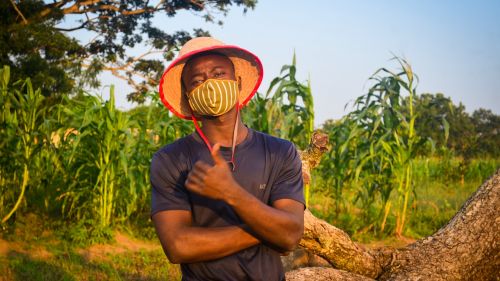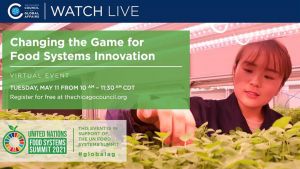Flower Wine, Inflation, and Misunderstood Potatoes

Check out the week's top news and research in food, agriculture, and global development!
Top Story
Changing the Game
The pandemic has shown the fragility of food systems and how their breakdown impacts health, economies, and the environment. Rethinking food systems is a shared responsibility that requires bold cooperation, commitments, and action from the public and private sectors. Game-changing innovations and high-impact solutions have the potential to radically transform the food system into a more sustainable, inclusive, nutritious and resilient one. How can new research, technologies, and innovations be leveraged? What are the impacts for people, the planet, and prosperity?
Our entirely virtual & free 2021 Global Food Security Symposium will tackle these big questions and more on May 11. Our Symposium will begin with a keynote interview with the Bill & Melinda Gates Foundation CEO, Mark Suzman & Chicago Council President, Ivo Daalder, and will feature a spotlight on the CGIAR's Claudia Sadoff. Following these remarks, a panel of cutting-edge game-changers will feature: Google X's Elliott Grant, Journey Foods founder, Riana Lynn, Impossible Foods' Head of Impact Strategy, Rebekah Moses, AgFunder's Louisa Burwood-Taylor, and IndigoAg's Dan Harburg. Peggy Yih, the Council’s Center on Global Food and Agriculture’s managing director, will give closing remarks. We hope you'll join us! Register today to join the conversation.
Council Insights
Misunderstood Potatoes
"Regardless of the reasons, plant biotechnology may be one of the most misunderstood technologies of all time," writes Dr. Dave Douches in an Earth Day commentary. Speaking from decades of plant breeding experience, he considers the potential of new varietals of potato, developed using biotechnology, that could reduce chemical fungicide use by up to 90 percent. The piece is the first of a new blog series, Harvesting Tomorrow, which highlights perspectives on innovation in food security.
SEE ALSO: Roger Thurow to Moderate Panel on Consumer Food Trends
Food and Agriculture
Netting Flowers
Tribal peoples in the forests of central India have adopted a simple technology to harvest the flowers of the mahua tree: a reusable net made from saris. Along with reliable scales, standardized pallets, and better sun-drying techniques, the nets save people from the back-breaking work of rummaging leaves on the ground, or burning them, to sort the flowers. The process is helping tribal folk turn the flowers into lucrative consumer products.
Inflating Inflation
Food inflation in Nigeria rose to 22.95 per cent in March, the fastest acceleration in food inflation in 15 years. Prices of food items such as cereals, yam, meat, fish, and fruits have skyrocketed. Compounding an unemployment of 33 percent, the government’s ban on food imports, insurgency, and civil unrest, rising food prices have exacerbated food insecurity in the country.
Climate-Resilient Coffee
New research has tracked down a type of wild coffee – Coffea stenophylla – that is pleasant to taste, and is also tolerant of higher temperatures. It can be found in Guinea, Sierra Leone, and Ivory Coast--places that market-dominant Coffea canephora and Coffea arabica do not flourish. To develop climate-resilient coffee plants in the future, stenophylla can be cultivated directly and crossbred with existing cultures.
Deeper Dive
Making Wine from Flowers
India's mahua tree can be used in a multitude of ways, including in soap, fodder for silkworms, and medicinal syrup. The sugar-rich flowers can also be fermented into a wine. This preparation is part of an ancient, indigenous fermentation culture that has been well-documented in India for centuries.

Register for this year's completely virtual & free Global Food Security Symposium and join game-changing conversations on the future of food systems.
Data Crunch
Communicating Science
A group of plant breeders, economists, and plant scientists is calling on both governments and the scientific community to increase efforts to communicate with the public. Pointing to widespread societal mistrust of biotechnology, the researchers caution that failure to communicate the benefits of new innovations could put global food security at risk.
Resilience
Bouncing Back
The Caribbean island of Dominica has been hit with two devastating natural disasters in the last 6 years. As part of the CC4Fish Project, FAO and the government of Dominica is supporting aquaculture to reduce climate vulnerability and produce food resources. The project focused on high-value freshwater prawn farming, which has the potential to supply local and regional markets.
Big Ideas
Super Soil
The Global Symposium on Soil Biodiversity began Monday with a focus on preserving the communities of soil organisms that provide essential ecosystem services. Soils contain more than 25 percent of the world’s biodiversity and are vital to food security and climate change mitigation. The symposium aims to fill gaps in knowledge and to work on solutions to global challenges, like hunger, through soil biodiversity.
DC Report
Seeking Feedback
In response to February's Executive Order 14017, the USDA is seeking public comment on Department-wide efforts to improve supply chains. The comments will help the department identify supply chain bottlenecks and vulnerabilities for a report required by the executive order.
Big Actors
Menu Change
China recently announced guidelines for reducing corn and soymeal in pig and poultry feed. The shift in policy from the world's top corn and soybean buyer could have a significant impact on global grain flows. The recommendations come after rising feed prices have made some producers switch to cheaper alternatives like wheat.
May-bee Not
UK retailer Marks & Spencer faced backlash for its plan to release 30 million honeybees into the British countryside to “do good for the environment.” Bee experts and conservationists emphasized that there are not enough wildflowers in the countryside to support the wild pollinators, and an increase in densities of managed honeybees could alter habitats and ecosystems.
Trade and Commodities
Beef with Regulations
Argentina’s latest resolution to re-establish a meat export registration system for foreign sales to regulate domestic supply, price, and quality has stoked concerns among cattle producers. Farmers and ranchers fear that interventionist regulations will limit international shipments and exports in an attempt to reduce domestic inflation and assert that the two are not related.
Futures Climbing
US corn and soy futures have climbed to their highest in eight and seven years respectively. Many factors contribute to the high price including tightening supplies, dry conditions possibly cutting Brazilian yields short, and cold weather interfering with US germination. Wheat futures followed the trend as well.

